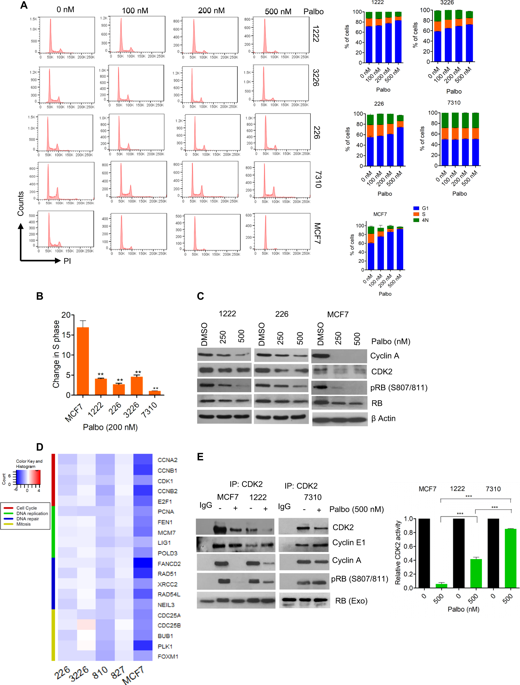Our official English website, www.x-mol.net, welcomes your
feedback! (Note: you will need to create a separate account there.)
Chemotherapy impacts on the cellular response to CDK4/6 inhibition: distinct mechanisms of interaction and efficacy in models of pancreatic cancer.
Oncogene ( IF 6.9 ) Pub Date : 2019-11-19 , DOI: 10.1038/s41388-019-1102-1 Vishnu Kumarasamy 1, 2 , Amanda Ruiz 3 , Ram Nambiar 1, 2 , Agnieszka K Witkiewicz 1, 4 , Erik S Knudsen 1, 2
Oncogene ( IF 6.9 ) Pub Date : 2019-11-19 , DOI: 10.1038/s41388-019-1102-1 Vishnu Kumarasamy 1, 2 , Amanda Ruiz 3 , Ram Nambiar 1, 2 , Agnieszka K Witkiewicz 1, 4 , Erik S Knudsen 1, 2
Affiliation

|
Pancreatic ductal adenocarcinoma (PDAC) is a therapy recalcitrant disease characterized by the aberrations in multiple genes that drive pathogenesis and limit therapeutic response. While CDK4/6 represents a downstream target of both KRAS mutation and loss of the CDKN2A tumor suppressor in PDAC, clinical and preclinical studies indicate that pharmacological CDK4/6 inhibitors are only modestly effective. Since chemotherapy represents the established backbone of PDAC treatment we evaluated the interaction of CDK4/6 inhibitors with gemcitabine and taxanes that are employed in the treatment of PDAC. Herein, we demonstrate that the difference in mechanisms of actions of chemotherapeutic agents elicit distinct effects on the cellular response to CDK4/6 inhibition. Gemcitabine largely ablates the function of CDK4/6 inhibition in S-phase arrested cells when administered contemporaneously; although, when cells recover from S-phase block they exhibit sensitivity to CDK4/6 inhibition. In contrast, pharmacological inhibition of CDK4/6 yields a cooperative cytostatic effect in combination with docetaxel and prevents adaptation and cell cycle re-entry, which is a common basis for resistance to such agents. Importantly, using organoid and PDX models we could confirm the cooperative effects between chemotherapy and CDK4/6 inhibition in vivo. These data indicate that the combination of cytotoxic and cytostatic agents could represent an important modality in those tumor types that are relatively resistant to CDK4/6 inhibitors.
中文翻译:

化疗对细胞对 CDK4/6 抑制反应的影响:胰腺癌模型中相互作用和功效的不同机制。
胰腺导管腺癌 (PDAC) 是一种治疗顽固性疾病,其特征在于驱动发病机制和限制治疗反应的多个基因的异常。虽然 CDK4/6 代表了 PDAC 中 KRAS 突变和 CDKN2A 肿瘤抑制因子缺失的下游靶点,但临床和临床前研究表明药理学 CDK4/6 抑制剂仅适度有效。由于化学疗法代表了 PDAC 治疗的既定支柱,我们评估了 CDK4/6 抑制剂与用于治疗 PDAC 的吉西他滨和紫杉烷的相互作用。在这里,我们证明了化学治疗剂作用机制的差异对细胞对 CDK4/6 抑制的反应产生了不同的影响。当同时给药时,吉西他滨在很大程度上消除了 S 期停滞细胞中 CDK4/6 抑制的功能;虽然,当细胞从 S 期阻滞恢复时,它们表现出对 CDK4/6 抑制的敏感性。相比之下,CDK4/6 的药理学抑制与多西紫杉醇组合产生协同细胞抑制作用,并防止适应和细胞周期重新进入,这是对此类药物耐药的常见基础。重要的是,使用类器官和 PDX 模型,我们可以确认化疗和体内 CDK4/6 抑制之间的协同作用。这些数据表明,在对 CDK4/6 抑制剂相对耐药的那些肿瘤类型中,细胞毒剂和细胞抑制剂的组合可能代表一种重要的方式。当细胞从 S 期阻滞中恢复时,它们表现出对 CDK4/6 抑制的敏感性。相比之下,CDK4/6 的药理学抑制与多西紫杉醇组合产生协同细胞抑制作用,并防止适应和细胞周期重新进入,这是对此类药物耐药的常见基础。重要的是,使用类器官和 PDX 模型,我们可以确认化疗和体内 CDK4/6 抑制之间的协同作用。这些数据表明,在对 CDK4/6 抑制剂相对耐药的那些肿瘤类型中,细胞毒剂和细胞抑制剂的组合可能代表一种重要的方式。当细胞从 S 期阻滞中恢复时,它们表现出对 CDK4/6 抑制的敏感性。相比之下,CDK4/6 的药理学抑制与多西紫杉醇组合产生协同细胞抑制作用,并防止适应和细胞周期重新进入,这是对此类药物耐药的常见基础。重要的是,使用类器官和 PDX 模型,我们可以确认化疗和体内 CDK4/6 抑制之间的协同作用。这些数据表明,在对 CDK4/6 抑制剂相对耐药的那些肿瘤类型中,细胞毒剂和细胞抑制剂的组合可能代表一种重要的方式。这是抵抗此类药剂的共同基础。重要的是,使用类器官和 PDX 模型,我们可以确认化疗和体内 CDK4/6 抑制之间的协同作用。这些数据表明,在对 CDK4/6 抑制剂相对耐药的那些肿瘤类型中,细胞毒剂和细胞抑制剂的组合可能代表一种重要的方式。这是抵抗此类药剂的共同基础。重要的是,使用类器官和 PDX 模型,我们可以确认化疗和体内 CDK4/6 抑制之间的协同作用。这些数据表明,在对 CDK4/6 抑制剂相对耐药的那些肿瘤类型中,细胞毒剂和细胞抑制剂的组合可能代表一种重要的方式。
更新日期:2019-11-20
中文翻译:

化疗对细胞对 CDK4/6 抑制反应的影响:胰腺癌模型中相互作用和功效的不同机制。
胰腺导管腺癌 (PDAC) 是一种治疗顽固性疾病,其特征在于驱动发病机制和限制治疗反应的多个基因的异常。虽然 CDK4/6 代表了 PDAC 中 KRAS 突变和 CDKN2A 肿瘤抑制因子缺失的下游靶点,但临床和临床前研究表明药理学 CDK4/6 抑制剂仅适度有效。由于化学疗法代表了 PDAC 治疗的既定支柱,我们评估了 CDK4/6 抑制剂与用于治疗 PDAC 的吉西他滨和紫杉烷的相互作用。在这里,我们证明了化学治疗剂作用机制的差异对细胞对 CDK4/6 抑制的反应产生了不同的影响。当同时给药时,吉西他滨在很大程度上消除了 S 期停滞细胞中 CDK4/6 抑制的功能;虽然,当细胞从 S 期阻滞恢复时,它们表现出对 CDK4/6 抑制的敏感性。相比之下,CDK4/6 的药理学抑制与多西紫杉醇组合产生协同细胞抑制作用,并防止适应和细胞周期重新进入,这是对此类药物耐药的常见基础。重要的是,使用类器官和 PDX 模型,我们可以确认化疗和体内 CDK4/6 抑制之间的协同作用。这些数据表明,在对 CDK4/6 抑制剂相对耐药的那些肿瘤类型中,细胞毒剂和细胞抑制剂的组合可能代表一种重要的方式。当细胞从 S 期阻滞中恢复时,它们表现出对 CDK4/6 抑制的敏感性。相比之下,CDK4/6 的药理学抑制与多西紫杉醇组合产生协同细胞抑制作用,并防止适应和细胞周期重新进入,这是对此类药物耐药的常见基础。重要的是,使用类器官和 PDX 模型,我们可以确认化疗和体内 CDK4/6 抑制之间的协同作用。这些数据表明,在对 CDK4/6 抑制剂相对耐药的那些肿瘤类型中,细胞毒剂和细胞抑制剂的组合可能代表一种重要的方式。当细胞从 S 期阻滞中恢复时,它们表现出对 CDK4/6 抑制的敏感性。相比之下,CDK4/6 的药理学抑制与多西紫杉醇组合产生协同细胞抑制作用,并防止适应和细胞周期重新进入,这是对此类药物耐药的常见基础。重要的是,使用类器官和 PDX 模型,我们可以确认化疗和体内 CDK4/6 抑制之间的协同作用。这些数据表明,在对 CDK4/6 抑制剂相对耐药的那些肿瘤类型中,细胞毒剂和细胞抑制剂的组合可能代表一种重要的方式。这是抵抗此类药剂的共同基础。重要的是,使用类器官和 PDX 模型,我们可以确认化疗和体内 CDK4/6 抑制之间的协同作用。这些数据表明,在对 CDK4/6 抑制剂相对耐药的那些肿瘤类型中,细胞毒剂和细胞抑制剂的组合可能代表一种重要的方式。这是抵抗此类药剂的共同基础。重要的是,使用类器官和 PDX 模型,我们可以确认化疗和体内 CDK4/6 抑制之间的协同作用。这些数据表明,在对 CDK4/6 抑制剂相对耐药的那些肿瘤类型中,细胞毒剂和细胞抑制剂的组合可能代表一种重要的方式。











































 京公网安备 11010802027423号
京公网安备 11010802027423号